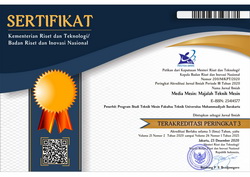Application of Silicon Nitride (Si3N4) Ceramics in Ball Bearing
Wijianto Wijianto(1*)(1) Universitas Muhammadiyah Surakarta
(*) Corresponding Author
Abstract
operation up to 1000°C, greater thermal shock resistance, lower density and low thermal expansion. This properties gives some benefit for ball bearing material such as higher running speed, reduce vibration of the shaft, will improve the life time and maintenance cost, lower heat generated, less energy consumption, lower wear rate, reducing noise level and reduce of using lubricant.
The sintering methods are used to produce ball bearing from silicon nitride. Some techniques can be applied to increase ceramics strength which are reduce porosity, reduce grain size, reduce surface flaw and proof stressing.
The surface finishing of the ceramic bearing is very important because silicon nitride as a brittle material, its strength is limited to the flaw sizes especially the flaw at the surface.
Full Text:
PDFReferences
Bearing Works, Retrieved: October 27, 2006 from http://www.bearingworks.com
Budinski, K.G. 1989,Engineering Meterials Properties & Selection, 3rd ed, Prentice Hall, New Jersey.
Callister, W. D. 2003, Materials Science and Engineering An Introduction, 6th ed, John Wiley & Sons, Inc.
Chen, Z. Cuneo, J. C. Mecholsky, J. J. & Hu, S. 1996, “Damage processes in Si3N4 bearing material under contact loading”, Wear, 198, pp. 197-207.
Davies, I. J. 2006,Ceramics and Glasses-Materials 434, Department of Mechanical Engineering Curtin University of Technology. Ferrovac GmbH, Retrieved: October 27, 2006 from http://www.ferrovac.ch
Kutz, M 2002, Handbook of Material Selection, John Wley & Son, Inc, New York.
Ling, G. & Yang, H. 2005, “Pressureless sintering of silicon nitride with Magnesia and Yttria”, Material Chemistry and Physics, 90, pp. 31-34.
Lube, T. and Dusza, J. 2006, “A silicon nitride reference material-a testing program of ESIS TC6”, Journal of the European Ceramics Society, pp. 1-5. Machine Design, Retrieved: October 27, 2006 from http://www.machinedesign.com.
MRC Bearing Services, Retrieved: October 27, 2006 from http://www.mrcbearingservices.com.
O’Brien, M. J. Presser, N. & Robinson, E. Y. 2003, “Failure analysis of three Si3N4 balls used in
hybrid bearings”, Journal of the European Ceramic Society, pp. 1-5.
Shanghai PYC Bearing International Inc, Retrieved: October 27, 2006 from http://www.lilybearings.com
Swab, J. J. and Sweeney, M. P. 1995, “Fracture analysis of an all-ceramic bearing system”, Engineering Failure Analysis, 2(3), pp. 175-190.
Tatli, Z. & Thompson, D.P. 2006, “Low temperature densification of silicon nitride materials”, Journal of the European Ceramic Society, pp. 1-5.
Thoma, K. Rohr, L. Rehmann, H. Roos, S. Michler J. 2004, “Material failure mechanism of hybrid ball bearings with silicon nitride balls”, Tribology International, 37, pp. 463-471.
Vuckovic, A. Boskovic, S. & Matovic, B. 2006, “Effect of b-Si3N4 seeds on densification and fracture toughness of silicon nitride”, ceramics International, 23, pp. 303-307.
Wang, L., Snidle, R. W. and Gu, L. 2000, “Rolling contact silicon nitride bearing technology: a review of recent research”, Wear, 246, pp. 159-173.
Wang, L., Wood, R. J. K., Harvey, T. J., Morris, S., Powrie, H. E. G. and Care, I. 2003, “Wear performance of oil lubricated silicon nitride sliding against various bearing steels”, Wear, 255, pp. 657-668.
Zaretsky, E. V. 1990, “Bearing and gear steels for aerospace applications”, NASA Technical Memorandum 102529, pp. 1-30.
Article Metrics
Abstract view(s): 918 time(s)PDF: 573 time(s)
Refbacks
- There are currently no refbacks.








